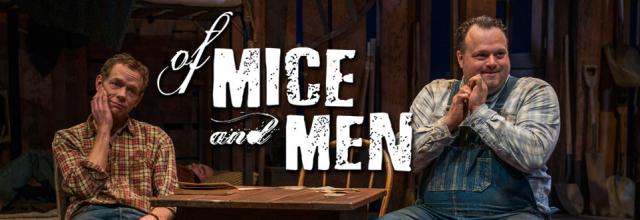
Man is not a solitary creature, as repeatedly emphasized in John Steinbeck’s Of Mice and Men. The 1937 play is being produced by the Milwaukee Repertory Theatrer and the Arizona Theatre Company. After winning some local awards in Arizona (where it played first), the production already was causing local buzz before it opened here in January. Under the firm direction of the Rep’s artistic director, Mark Clements, the play takes a strong, linear path to its devastating conclusion. For the uninitiated, Of Mice and Men focuses on a pair of migrant ranch hands, George and Lennie, who are making the rounds of California ranches during the Great Depression. Of Mice and Men opened on Broadway in 1937, and has been revived twice since them. In 1974, the role of Lennie was played by James Earl Jones. The most recent revival, at the Longacre Theatre in 2014, starred James Franco and Chris O’Dowd. The play, which is taken from Steinbeck’s book, also has been turned into several films and TV movies.
Work of any kind was valued during the Depression—even 11-hour days bailing hay and doing other menial chores. The two men realize they are fortunate to find a position, after a disaster caused by Lennie in the last town where they worked. Steinbeck’s masterpiece tackles not only the subjects of isolation and loneliness, but also the fears caused by the Great Depression and the now seemingly unattainable American Dream. It also makes a strong statement about the racism of the time.
As the play opens in the spacious Quadracci Powerhouse, the men take an unexpected break before their next work assignment. The set—covered in burlap to approximate a forest clearing—is minimally equipped with a few tree stumps and a stream. George looks up at the sky and is glad to have his freedom – at least for one night.
The audience soon learns that George is quick-witted and crafty. He just manages to keep them out of the trouble Lennie causes. Lennie, a huge man with a heart to match but with the intelligence of a four-year-old, depends on George’s care. They have been friends since childhood. Lennie’s mental disabilities are an issue since Lennie doesn’t realize his own incredible strength. He says he likes to pet soft things, such as mice and puppies. He inadvertently kills them. Like a small child, Lennie blames the animals for “getting killed so easy.” The pair is portrayed by local actor Jonathan Wainwright as George and Scott Greer as Lennie. Greer also played the role in Arizona. Wainwright’s naturally boyish face has been made to show the tough conditions his character has faced. Wainwright’s wind-burned-skin, well-worn jeans and rumpled bedroll all enhance his credibility. Wainwright gives an excellent performance as he balances George’s need for companionship with his hope of an independent future. Throughout the play, George expresses his dream of owning a ranch and harvesting his own crops. Lennie fixates on what will be his task on the ranch – to tend their rabbits. As Lennie, Scott Greer plays an innocent who is “too dumb” to understand when jokes are being played on him. Aside from his spastic hand movements—which are a bit overdone—Greer delivers a not-to-be missed performance. He has mastered the soft, sometimes irritating voice of a demanding child. When Lennie’s hands aren’t twitching, Greer often moves his hands towards his face, as if to shield his character from the outside world. It’s an effective touch.
The bunk house (made of loosely worn planks, beautifully lit from behind) is occupied by the other ranch hands. In addition, the elderly Candy (played by the always-solid Jim Pickering) keeps the place clean and tends to his old, useless dog. Candy fears that when the half-blind, arthritic, toothless dog is eliminated, it foretells his own fate. With the exception of Curley (Bernard Balbot), the hot-headed boss’ son, all the ranch hands seem to adjust to each other. They are all leery of Curley’s wife (dreamily played by Kelley Faulkner). She keeps wandering over to the bunk house, despite multiple warnings to stay out. She claims she “just wants someone to talk to.” When the woman is alone with Lennie in the barn, she reveals her own “happy ending.” She has packed a suitcase and is headed to Hollywood, in the hope of landing movie roles. In some ways, she is as naive as Lennie. Her final scene is particularly well-staged. The Milwaukee Rep production benefits enormously from a talented cast and especially from a top-notch production team. Even the set changes demonstrate a bit of dramatic flair. At sunset, the ranchers are sometimes silhouetted against a brilliantly hued landscape. Even the music, featuring a lonely harmonica and guitar, sets the mood and the timeframe. For the moment, at least, Of Mice and Men is the theater season’s outstanding production of 2016.
